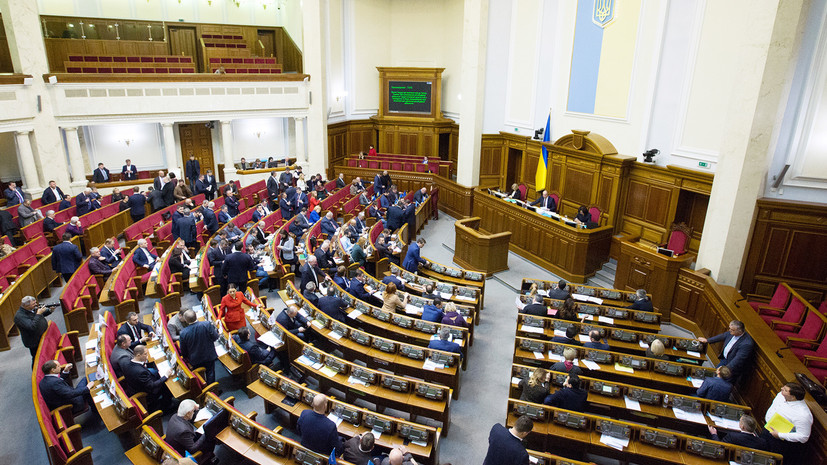Ukraine decided not to renew the Treaty of Friendship, Cooperation and Partnership with Russia. According to the law adopted by the Verkhovna Rada, the agreement will expire on April 1, 2019.
On December 3, the President of Ukraine Petro Poroshenko submitted a document for consideration by the Parliament. In favor of the adoption of the bill expressed 277 deputies with the necessary minimum of 226 people.
The Ukrainian side claims that the reason for the refusal to extend the treaty was “the armed aggression of Russia against Ukraine”.
The Council of Federation is confident that in the future the foreign policy agenda in the rhetoric of Kiev will only increase.
“This is only the beginning of a series of political provocations initiated by the US Department of State, whose obedient tool is Poroshenko’s regime clinging to power,” Olga Kovitydi, member of the Federation Council Committee on Defense and Security, told RT.
The State Duma said that Kiev’s decision not to extend the contract was due to the upcoming elections in Ukraine. According to a member of the committee of the lower house of parliament for CIS affairs, Eurasian integration and the affairs of compatriots Kazbek Taisayev, the Ukrainian authorities are doing everything to break bilateral relations.
“These are populist steps. All this is connected with the elections, ”RIA Novosti quotes Taisayeva.
In turn, the Russian Foreign Ministry reacted with irony to the decision of the Ukrainian authorities. The official representative of the department, Maria Zakharova, suggested that "the Kiev regime decided to fill the April Fools' Day with concrete content."
"Big Treaty"
The Treaty of Friendship, Cooperation and Partnership between the Russian Federation and Ukraine, or the “Big Treaty”, was signed in Kiev on May 31, 1997 by the presidents of Russia and Ukraine, Boris Yeltsin and Leonid Kuchma. The document came into force on April 1, 1999.
The contract was adopted for a period of 10 years with the possibility of automatic renewal in the absence of objections by the parties. According to this principle, the agreement was renewed in October 2008 for another ten years - until April 1, 2019.
The document defined the relationship between Russia and Ukraine in various fields, including economic and social. Among the clauses of the agreement are mutual guarantees of protection of ethnic, cultural, linguistic and religious identity of national minorities, refusal of economic activities that could harm each other, creating conditions for mutual learning of languages, ensuring transit through each other’s territories and much more.
Kiev has repeatedly accused Russia of violating the treaty in connection with the referendum and the subsequent reunification of the Crimea with the Russian Federation. In March 2018, the Ukrainian Foreign Ministry presented Poroshenko with a package of proposals for withdrawing from the agreement. In August, the Ukrainian president instructed the ministry to prepare to refuse to extend the contract. In September, this initiative was supported by the National Security and Defense Council of Ukraine. In the same month, Kiev sent an official note on the non-renewal of the treaty to the Russian Foreign Ministry.
At the same time, Kiev publicly acknowledged that the contract was due to work on international judicial proceedings with Moscow.
“At that time, we needed him to prepare all the claims and documents to international courts and institutions,” said the deputy head of the presidential administration of Ukraine Konstantin Yeliseyev.
At the same time, the agreement has not actually been in effect for the past four years, and no one will benefit from a formal exit, said Rostislav Ischenko, president of the Center for System Analysis and Forecasting.
“Everyone who could have already lost. Ukraine has already stopped economic cooperation, military-technical cooperation, only gas transit through Ukraine remained, which was not regulated by this agreement ... It is not beneficial for anyone. Ukraine does not acquire anything from a non-renewal, it did not want and did not fulfill it that way. In relation to it, Russia has already complied with the positions of this treaty, ”the expert said in an interview with RT.
May affect ordinary people.
On the eve of the signing of the law on the non-renewal of the contract, Poroshenko announced the transfer of troops to the border with Russia for the period of martial law introduced in Ukraine. Recall, the law on the appropriate measure came into force on November 29.
According to Poroshenko, exercises will also be held in the country, and in areas where martial law has been declared, training camps will be held with the first line reserve. The Ukrainian leader expressed the hope that the military situation would not have to be extended for a longer period, and the measures already taken would be enough to “protect citizens from the enemy.”
“The combat units and units of the Armed Forces of Ukraine are relocating to the most dangerous directions along the entire line of our border in order to strengthen the defensive capabilities and be ready to stop the aggressor without losing a second,” Poroshenko wrote in his Twitter account.
The authorities of Ukraine by their actions destroy the entire legal base of relations with Russia, and ordinary citizens will suffer from these steps. About this in a conversation with RT said the director of the Institute for Peace Initiatives and Conflictology Denis Denisov.
“The agreement is rather symbolic, but at once it is linked to it, although it is bound to cancel the cancellation of about 40 agreements,” Denisov said.
The adopted document adopted by the Rada confirms the position of the Ukrainian authorities, which are not inclined to engage in constructive dialogue with Russia, the expert believes.
“Under the current political regime in Ukraine, there is no need to talk about normalization of relations, Ukraine will continue to try, conditionally speaking, to integrate, although we understand that this process is also in words,” said Denisov.

